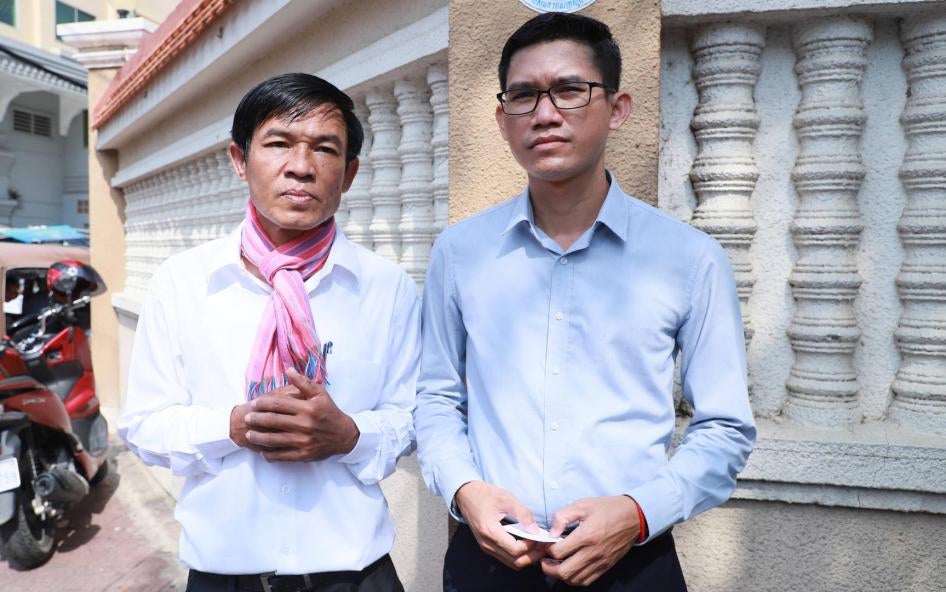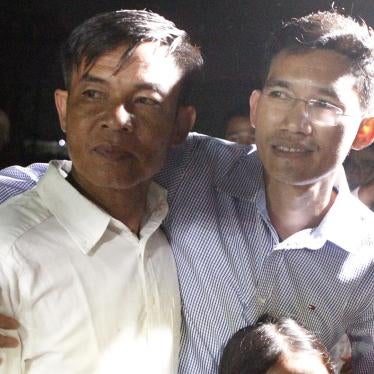(Bangkok, November 14, 2019) – Cambodian authorities should drop the bogus espionage charges against two former Radio Free Asia (RFA) journalists, Human Rights Watch said today. Uon Chhin and Yeang Sothearin were arrested on November 14, 2017 but have not been brought to trial.
A judge in Phnom Penh ruled, on October 3, 2019, that there was insufficient evidence against the two men but sent the case for re-investigation instead of dismissing it.
“The case against Chhin and Sothearin should have been dropped long ago, but Cambodia’s government seems intent on using baseless charges as a warning to other independent journalists,” said Phil Robertson, deputy Asia director at Human Rights Watch. “The never-ending case is part of the government’s campaign to silence all critical reporting in the country.”
Both journalists were released on bail after nearly a year in arbitrary pretrial detention. But they are still unable to travel abroad, have been subjected to frequent demands by investigating judges, and now face apprehension and uncertainty in their personal and professional lives because of the ongoing charges against them, Human Rights Watch said.
When the police arrested the men, Sothearin was RFA’s former Phnom Penh bureau office manager and a news editor, and his colleague, Chhin, was a former RFA cameraman. Four days later, the Phnom Penh Municipal Court charged both with supplying a foreign state with information prejudicial to Cambodia’s national defense under article 445 of the criminal code, an offense punishable by 7 to 15 years in prison. After nine months, the investigating judge released both from jail and placed them under judicial supervision.
The arrests came two months after RFA shut down its Cambodia bureau and local newsgathering operations, alleging that the government’s systematic harassment of its reporters compelled it to close the bureau. Cambodian authorities accused Sothearin and Chhin of illegally setting up a broadcast studio with the purpose of continuing to file news reports to RFA’s headquarters in Washington, DC.
On March 15, 2019, the investigating judge of the Phnom Penh court ordered the case to go to trial. On August 30, the Phnom Penh court trial judge scheduled a verdict hearing, but on the morning of the hearing he failed to appear in the courtroom, resulting in a postponement of the hearing to October 3.
RFA has had a long history of reporting on corruption, social and labor issues, human rights, illegal logging, and violations of land rights in Cambodia. In August 2017, the Cambodian authorities ordered the closure of 32 FM radio frequencies across 20 provinces, particularly stations that relayed independent Khmer language news broadcast by RFA, Voice of America, and Voice of Democracy. After the RFA Phnom Penh bureau closed, senior officials from the Ministries of Interior and Information threatened any journalists still filing media reports to RFA, saying that they would be treated as spies.
In March 2018, prosecutors brought additional unfounded charges against Chhin and Sothearin that they produced pornography, in violation of the Law on the Suppression of Human Trafficking and Sexual Exploitation. If convicted of these additional charges, they face 16 years in prison. The judge decided in October that these charges were also subject to re-investigation.
On May 29, the United Nations Working Group on Arbitrary Detention concluded the “violations of the right to a fair trial are of such gravity as to give the deprivation of liberty of Mr. Uon and Mr. Yeang an arbitrary character.” The working group also said article 445 of the Cambodian criminal code was not in line with Cambodia’s international human rights obligations because it did not offer a definition of what constitutes an offense under that provision, leaving broad and unfettered discretion to authorities that risks abuse.
Cambodia’s press freedom and freedom of expression, both online and offline, came under broad attack by the authorities prior to the July 2018 elections. One of the two main independent newspapers was forcibly closed and the other sold to a businessman with ties to the Hun Sen government. Human Rights Watch has received repeated reports of harassment of journalists who report on social and political issues for the few remaining independent local and international news outlets. The authorities are telling these reporters they require permission to report in their provinces.
“The persistence of the bogus case against Chhin and Sothearin is strong evidence of Cambodian government’s control of the courts,” Robertson said. “European Union member countries and other foreign governments and donors should call upon the Cambodian government to stop harassing independent journalists and allow them to operate freely.”







